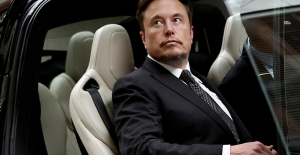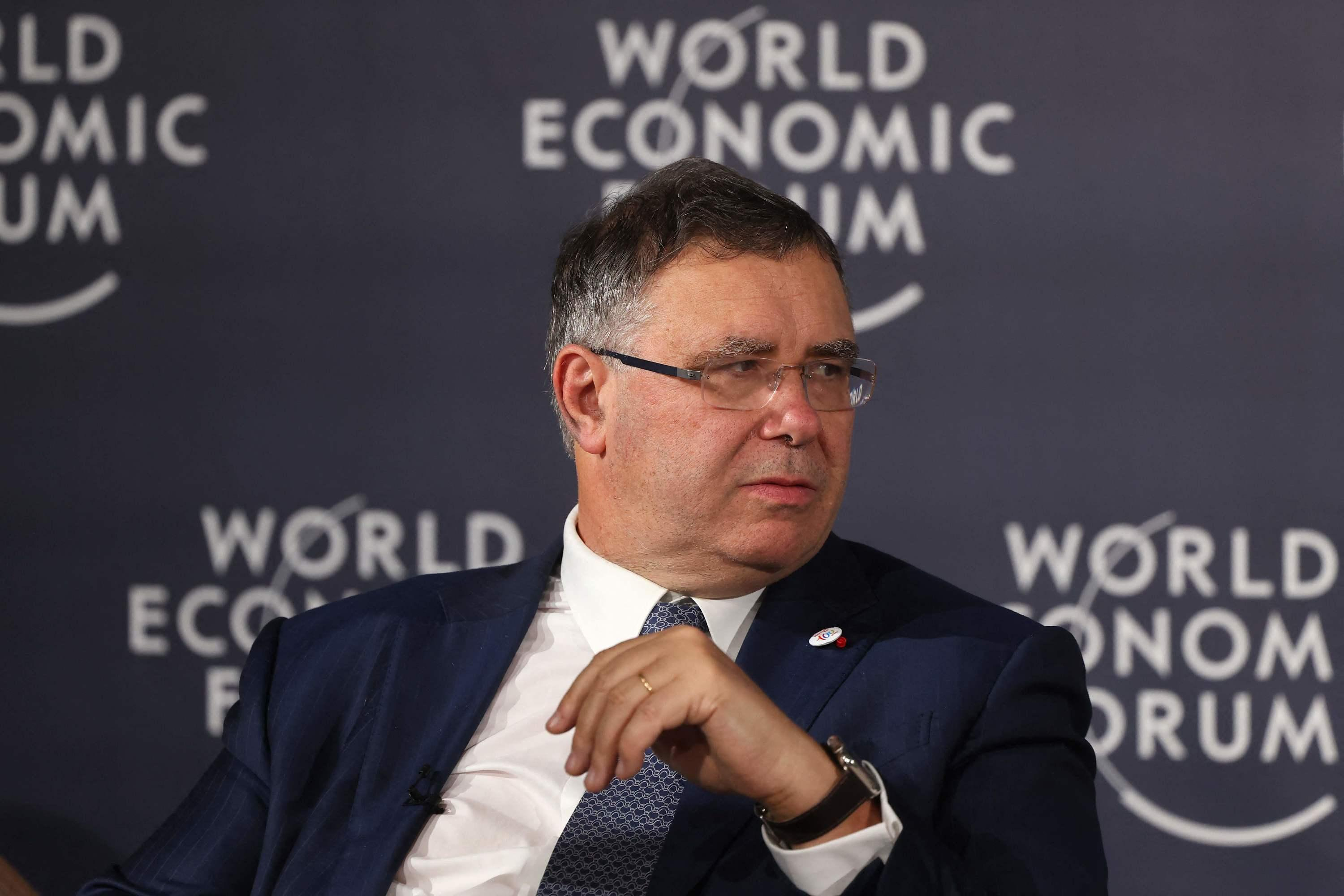Almost exactly one year to the day after the start of the Russian war of aggression in Ukraine, the Committee on Eastern European Economic Relations draws a sobering conclusion on the impact of the sanctions against the Russian regime. "There will be no collapse of the Russian economy," said CEO Michael Harms. "And Putin will not run out of money for the war either."
Although the sanctions imposed by the West had had an effect, the Russian economy did not grow by around three percent, as expected before the start of the war, but shrank by three percent. But a rapid, massive slump in economic output is not to be recorded.
In the long term, the economy in Russia will become “primitive”, but in the short term President Vladimir Putin's regime has managed to stabilize Russia's energy exports with a “clever policy on the part of the central bank” and other markets. Above all, countries like China and India stepped in as buyers. Overall, the countries that account for around 30 to 40 percent of global economic output would not participate in the sanctions.
It was always about putting a "price tag" on Russia's war of aggression with the sanctions, said Harms. "That price tag was pretty big." Looking at the development of foreign trade between Germany and Russia, however, the crash last year was by no means as big as one might have assumed.
The volume of goods traffic fell from almost 60 to almost 50 billion euros. As a result, Russia only slipped from 13th to 16th place in the ranking of Germany's most important trading partners.
However, there are very different developments in exports and imports: while exports to Russia fell by more than 45 percent from 26.6 to just 14.6 billion euros, imports even increased. In 2022 they were a good two billion euros higher than in the previous year. This was partly due to the fact that the imports of energy sources such as gas and oil, which continued for many months last year due to the Ukraine war, were significantly more expensive than in previous years.
In addition to the general decline, there have also been significant shifts in exports, said Harms. With more than three billion euros, pharmaceutical products made up the majority of exports from Germany to Russia. Compared to the previous year, 17.6 percent more goods were exported in this category.
The increase in agricultural and forestry products is even clearer, with growth of more than 45 and a good 48 percent, respectively. Trade focuses primarily on areas that are deliberately excluded, such as agriculture, food and medical products, said Harms.
Exports of vehicles fell sharply (minus 76 percent), significantly fewer machines and furniture were sold from Germany to Russia (each a good 50 percent less), exports in the data processing equipment category even fell by almost two thirds.
On the import side, there was growth above all in energy sources. The value of the Russian oil and natural gas supplies imported by Germany fell slightly by a good five percent. On the other hand, coal imports increased by more than 50 percent, and imports of mineral oil and coke oven products even doubled in value.
However, the fact that the statistics for individual product groups show a sharp decline in the export of German goods to Russia does not necessarily mean that they do not actually get there. It is repeatedly reported that sanctions are sometimes circumvented via other routes.
Some trade balances of other countries, especially in Central Asia, can at least be read as an indication of this. For example, exports of German vehicles to Kazakhstan quintupled. Overall, foreign trade with the Central Asian country almost doubled last year, with both imports and exports increasing sharply. Other countries, such as Armenia, also benefited particularly. Trade with countries such as Poland, the Czech Republic, Hungary, Romania and Slovakia each grew by double-digit percentages.
The Eastern European Committee does not believe that some countries are circumventing the sanctions on a large scale. "We categorically rule out deliberate circumvention of sanctions by German companies," said Harms. If they do exist from individual companies, they are a case for the public prosecutor.
The Eastern Committee, which has had a strong focus on Russia in the past, does not expect relations to return to normal in the short term - even if the Ukraine war comes to an end. "There will be no normal trade relations with Russia in the foreseeable future," said Harms.
"Everything on shares" is the daily stock exchange shot from the WELT business editorial team. Every morning from 7 a.m. with our financial journalists. For stock market experts and beginners. Subscribe to the podcast on Spotify, Apple Podcast, Amazon Music and Deezer. Or directly via RSS feed.

 B:SM will break its investment record this year with 62 million euros
B:SM will break its investment record this year with 62 million euros War in Ukraine: when kyiv attacks Russia with inflatable balloons loaded with explosives
War in Ukraine: when kyiv attacks Russia with inflatable balloons loaded with explosives United States: divided on the question of presidential immunity, the Supreme Court offers respite to Trump
United States: divided on the question of presidential immunity, the Supreme Court offers respite to Trump Maurizio Molinari: “the Scurati affair, a European injury”
Maurizio Molinari: “the Scurati affair, a European injury” Irritable bowel syndrome: the effectiveness of low-carbohydrate diets is confirmed
Irritable bowel syndrome: the effectiveness of low-carbohydrate diets is confirmed Beware of the three main sources of poisoning in children
Beware of the three main sources of poisoning in children First three cases of “native” cholera confirmed in Mayotte
First three cases of “native” cholera confirmed in Mayotte Meningitis: compulsory vaccination for babies will be extended in 2025
Meningitis: compulsory vaccination for babies will be extended in 2025 Thanks to intelligent cameras, RATP will indicate the least crowded trains on line 14
Thanks to intelligent cameras, RATP will indicate the least crowded trains on line 14 Dubai begins the transformation of Al-Maktoum to make it the future “largest airport in the world”
Dubai begins the transformation of Al-Maktoum to make it the future “largest airport in the world” When traveling abroad, money is a source of stress for seven out of ten French people
When traveling abroad, money is a source of stress for seven out of ten French people Elon Musk arrives in China to negotiate data transfer and deployment of Tesla autopilot
Elon Musk arrives in China to negotiate data transfer and deployment of Tesla autopilot Two people arrested for attempted damage to classified property at the Musée d’Orsay
Two people arrested for attempted damage to classified property at the Musée d’Orsay Death of composer Jean Musy, at 76, author of the music of Papy fait de la resistance, Les Champs-Élysées
Death of composer Jean Musy, at 76, author of the music of Papy fait de la resistance, Les Champs-Élysées Fanny Ardant prodigious in The Wound and the Thirst
Fanny Ardant prodigious in The Wound and the Thirst Hospitalized for pneumonia, Véronique Sanson cancels her concert in Nantes
Hospitalized for pneumonia, Véronique Sanson cancels her concert in Nantes Skoda Kodiaq 2024: a 'beast' plug-in hybrid SUV
Skoda Kodiaq 2024: a 'beast' plug-in hybrid SUV Tesla launches a new Model Y with 600 km of autonomy at a "more accessible price"
Tesla launches a new Model Y with 600 km of autonomy at a "more accessible price" The 10 best-selling cars in March 2024 in Spain: sales fall due to Easter
The 10 best-selling cars in March 2024 in Spain: sales fall due to Easter A private jet company buys more than 100 flying cars
A private jet company buys more than 100 flying cars This is how housing prices have changed in Spain in the last decade
This is how housing prices have changed in Spain in the last decade The home mortgage firm drops 10% in January and interest soars to 3.46%
The home mortgage firm drops 10% in January and interest soars to 3.46% The jewel of the Rocío de Nagüeles urbanization: a dream villa in Marbella
The jewel of the Rocío de Nagüeles urbanization: a dream villa in Marbella Rental prices grow by 7.3% in February: where does it go up and where does it go down?
Rental prices grow by 7.3% in February: where does it go up and where does it go down? Europeans: a senior official on the National Rally list
Europeans: a senior official on the National Rally list Blockade of Sciences Po: the right denounces a “drift”, the government charges the rebels
Blockade of Sciences Po: the right denounces a “drift”, the government charges the rebels Even on a mission for NATO, the Charles-de-Gaulle remains under French control, Lecornu responds to Mélenchon
Even on a mission for NATO, the Charles-de-Gaulle remains under French control, Lecornu responds to Mélenchon “Deadly Europe”, “economic decline”, immigration… What to remember from Emmanuel Macron’s speech at the Sorbonne
“Deadly Europe”, “economic decline”, immigration… What to remember from Emmanuel Macron’s speech at the Sorbonne These French cities that will boycott the World Cup in Qatar
These French cities that will boycott the World Cup in Qatar Mercato: Fonseca coach of AC Milan? The Lille coach speaks
Mercato: Fonseca coach of AC Milan? The Lille coach speaks Ligue 1: OM with a three-way defense, Lens changes almost nothing
Ligue 1: OM with a three-way defense, Lens changes almost nothing Ligue 1: PSG officially crowned champion of France for the 12th time
Ligue 1: PSG officially crowned champion of France for the 12th time Ligue 1: Lyon offers Monaco and gets closer to a European place
Ligue 1: Lyon offers Monaco and gets closer to a European place

















